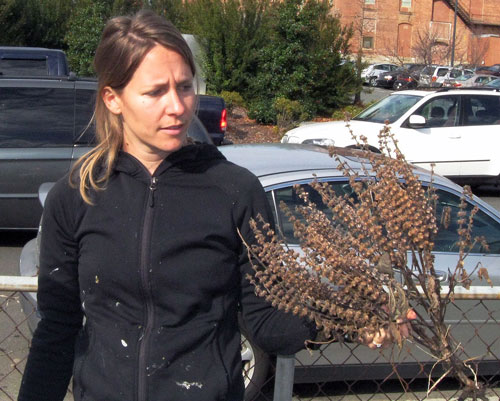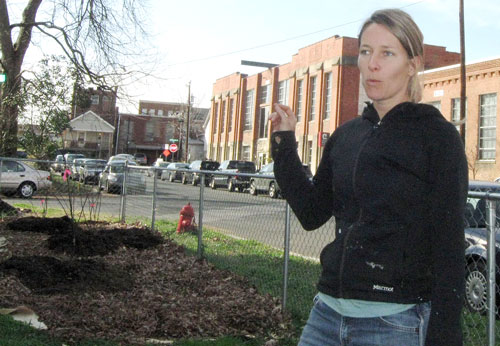By Sharif Ruebin
YO:Durham Intern
the Durham VOICE
thedurhamvoice@gmail.com
Growing gardens can transform health, back yards and neighborhoods.
At least that’s what local edible landscaper Angie Jones believes.
A resident of the Golden Belt neighborhood in Northeast Central Durham, Jones arrived 12 years ago from Indiana to teach with AmeriCorps as one of the first teachers at Josephine Dobbs Clement Early College High School. She said she and her husband, Jordan, wanted to be in a community where everyone doesn’t look like them.

Angie Jones pulls up dead herbs in her backyard garden. She explained to the VOICE that many herbs have medicinal qualities in addition to culinary flavors. (Staff photo by Sharif Ruebin)
After a year teaching, she became involved with community service by working with Durham Habitat for Humanity as a construction supervisor on her street, Morning Glory Avenue.
But now, in her free time, Jones is working to transform her small corner of the neighborhood into a little bit of Eden through the art of edible landscaping.
Edible landscaping is a technique that uses food producing plants to make landscapes beautiful but also provide nutritional food and help keep land fertile and sustained.
“My interest in gardening began six years ago when I was mostly interested because I was struggling with allergies,” said Jones.
Jones became interested in medicinal herbs, such as lemon and bee balms, which she said is good for sinuses and also keeps pest and insects out of gardens.
Before edible landscaping, Jones said it never crossed her mind to shop locally for fruits and vegetables in season. But after leaving Habitat, Jones began reading and experimenting with gardening which eventually led to her idea.
Currently Jones is working to change the backyard of her newly renovated home into a community garden. Jones and her husband renovated their house about two years ago and consider the garden as the second part of their renovations.
“We took one look at the yard and thought this one could be a community garden,” she said.
When the backyard is completed as a community garden, Jones hopes to be able to allow neighbors in the community access to healthy produce that sometimes is hard to find in northeast central Durham.
Considering the project a work in progress, Jones refers to it as “permaculture,” a concept that looks at nature’s efficiency and regeneration and asks how humans can mimic it.
The Jones’ backyard garden would follow the rules of nature such as the maintenance of resources, or sustainability, and the restoration of resources, or regeneration.
The garden design includes wheel barrel paths that follow patterns like leaf veins which consist of wood chips to retain water. The garden uses specialized sheet mulching compost that Jones lays all over her backyard, then layers it with leaves, compost and mulch on top.

Angie Jones explains that she has planted fruit trees next to the west side of her self-renovated house. Planting in this way allows her to use nature to help cool her house in the summer instead of more electricity. (Staff photo by Sharif Ruebin)
“This smothers Bermuda grass which interferes with plants, but is also great to work with and plant in,” said Jones. “Kids from the neighborhood will come by and help, put their hands in the soil and ask what I am doing.”
In addition, the garden has its own self-sustaining compost pile which uses organic materials such as straw, dead leaves, coffee grounds or yard clippings. Jones also uses table scraps and her husband’s t-shirts in the compost pile.
“If you stir the pile every week it’ll be ready in a few months but if not maybe a whole year,” Jones said. “Then you can use it as a mulch or fertilizer.”
In the garden Jones has specific spots for plants ranging from trees and shrubs to herbs like ginseng and golden seal. Fruit trees such as Asian pears and figs are protected from sunlight due to older, taller trees in her neighbors’ yards. She also has plots to grow kiwi, serviceberry, Muscadine grapes, blueberries and tomatoes.
Because urban runoff is a big polluter, Jones also uses nature’s resources with rain barrels that help to provide clean water for the garden and eventually runs down to a nearby lake. She said by running this water through the garden, the plants help to clean out any negative materials within it.
Jones said her definition of community gardening has been evolving, but she gets help and inspiration from Bountiful Backyards, a local gardening cooperative located at 204 Vine St. In addition to gardening, the business also teaches courses at Durham Technical Community College and mentor local teen programs, such as SEEDS, in the art.
“Bountiful Backyards is a model I follow,” said Jones. “They believe the resources should be from the people in the community.”
Jones said she never grew up on a farm in the upper Midwest but has learned through books such as her favorite, “Gaia’s Garden: A Guide to Home-Scale Permaculture” by Toby Hemenway.
Teaching the community about nature’s sustainability and healthful qualities while being a good neighbor is how this resident leaves her footprint on the neighborhood.
“I like working with my hands but gardening is more artistic than just following plans,” she said. “It’s an artistic way to have a less ecological footprint.”
Growing Herbs says:
I think i am the only one that is involved with Growing Herbs in my backyard. It not only saves money and time going but it’s also a very healthy benefit for you and anyone who is involved. Thanks for the post it was very informational…
Angie Capps says:
Thanks for writing! You make me sound like an expert, but really anyone can learn this! And, yes, herbs are easy and a great way to start!
Just want to mention that Asian Pears and figs like full sun, (just in case anyone reads this and plants them). I may have been referring to the mushrooms that I keep in protected in the shade from the neighbor’s trees.
Also, the “nearby lake” is via our city storm-drains… good to slow the water through a rain garden before it dumps urban runoff into our creeks.
Angie
edward nr popelka jr. says:
Hello Angie, I really love what you are doing. I am very interested in forest farming modeled by permaculture designs. I would like my forest farm to be a model for all, especially the younger generation. This is the footprint i would enjoy leaving for my children. I am very exited about this project. I am in an oak grove. I have already started my herb garden and will consider thinning out the oak trees. I am going to plant some persimmons trees as i love persimmons pudding. I am also thinking of maybe some water plants like lilies or lotuses which have edible and medicinal values. I am doing this on a quarter acre off a channel. Any direction or guidance would be greatly appreciated. Thx : ) ED